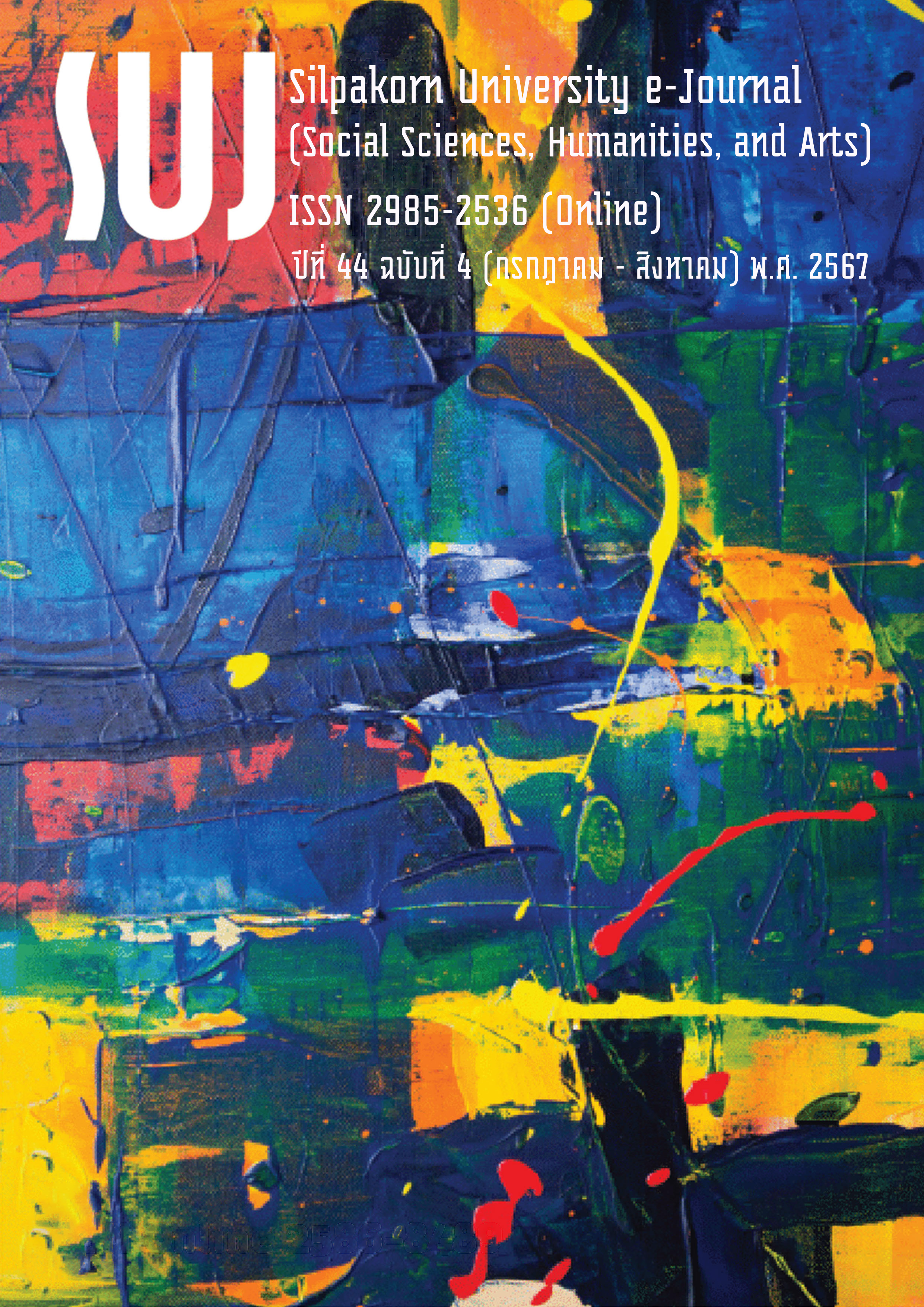กิจกรรมฝึกอบรมแบบผสมผสานเพื่อส่งเสริมความสามารถในการออกแบบการเรียนการสอนเชิงอนุรักษ์มรดกทางศิลปวัฒนธรรมในท้องถิ่น (Blended training activities for enhancing instructional design abilities in local art and culture heritage conservation)
Main Article Content
บทคัดย่อ
การวิจัยครั้งนี้มีวัตถุประสงค์เพื่อ 1) พัฒนากิจกรรมฝึกอบรมแบบผสมผสาน เรื่อง การออกแบบการเรียนการสอนเชิงอนุรักษ์มรดกทางศิลปวัฒนธรรมในท้องถิ่น ตามกรอบการประเมินสมรรถนะทางวิชาชีพครูของคุรุสภา สำหรับนักศึกษาวิชาชีพครูสังคมศึกษา 2) ศึกษาความสามารถในการออกแบบการเรียนการสอนเชิงอนุรักษ์มรดกทางศิลปวัฒนธรรมในท้องถิ่น ตามกรอบการประเมินสมรรถนะทางวิชาชีพครูของคุรุสภา ของนักศึกษาวิชาชีพครูสังคมศึกษา และ 3) ศึกษาความคิดเห็นของนักศึกษาวิชาชีพครูสังคมศึกษาที่มีต่อกิจกรรมฝึกอบรมแบบผสมผสาน เรื่อง การออกแบบการเรียนการสอนเชิงอนุรักษ์มรดกทางศิลปวัฒนธรรมในท้องถิ่น ตามกรอบการประเมินสมรรถนะทางวิชาชีพครูของคุรุสภา สำหรับนักศึกษาวิชาชีพครูสังคมศึกษา กลุ่มเป้าหมายที่ใช้ในการวิจัย คือ นักศึกษาวิชาชีพครูสังคมศึกษา คณะครุศาสตร์ มหาวิทยาลัยราชภัฏกาญจนบุรี จำนวน 30 คน ได้มาด้วยวิธีการคัดเลือกแบบอาสาสมัคร เครื่องมือที่ใช้ในการวิจัย ได้แก่ แผนการจัดกิจกรรมฝึกอบรมแบบผสมผสาน แบบประเมินความสามารถ และแบบถอดบทเรียน วิเคราะห์ข้อมูลโดยการหาค่าเฉลี่ย ส่วนเบี่ยงเบนมาตรฐาน และการวิเคราะห์เนื้อหา ผลการวิจัยพบว่า 1) กิจกรรมฝึกอบรมแบบผสมผสาน เป็นการฝึกอบรมแบบออนไลน์และแบบปกติ ในสัดส่วน 50:50 โดยมีแผนการจัดกิจกรรม จำนวน 6 ครั้ง รวม 16 ชั่วโมง ผลการประเมินคุณภาพมีค่าเฉลี่ยอยู่ในระดับเหมาะสมมากที่สุด 2) ความสามารถในการออกแบบการเรียนการสอนเชิงอนุรักษ์มรดกทางศิลปวัฒนธรรมในท้องถิ่น ตามกรอบการประเมินสมรรถนะทางวิชาชีพครูของคุรุสภา อยู่ในระดับดี และ 3) อาสาสมัครมีความคิดเห็นว่า ขั้นตอนที่ทำได้ดี คือ การฝึกอบรมที่นำมาสู่การพัฒนากิจกรรมการเรียนรู้ ขั้นตอนที่ทำได้ไม่ดี คือ การใช้สื่อเทคโนโลยีที่ครอบคลุมการประเมินผลการเรียนรู้ ปัญหาและอุปสรรค คือ ระยะเวลาการนำกิจกรรมการเรียนรู้ไปใช้ข้อค้นพบสำคัญ คือ การพัฒนาเนื้อหาและการนำไปใช้จัดการเรียนรู้ร่วมกับสื่อเทคโนโลยี เป็นการอนุรักษ์ผ่านการศึกษาที่ช่วยให้ผู้เรียนเห็นคุณค่าของมรดกทางศิลปวัฒนธรรมในท้องถิ่น ตามมาตรฐานของคุรุสภา
This research aimed to: 1) develop blended training activities on instructional design for local art and culture heritage conservation, based on the teachers council’s teaching professional competency criteria for pre-service social studies teachers; 2) evaluate the abilities in instructional design for local art and culture heritage conservation according to the teachers’ council criteria; and 3) assess their opinions on the blended training activities. on the topic of instructional design for local art and culture heritage conservation, as per the teachers council’s criteria. The research target group comprised 30 students majoring in Social Studies Education at the Faculty of Education, Kanchanaburi Rajabhat University. They were selected through a voluntary selection method. The instruments used in the research included a blended training plan, an abilities assessment form, and a lesson learned documentation form. Data were analyzed using mean, standard deviation, and content analysis. The results revealed that: 1) The blended training activities, consisting of 50% online and 50% conventional formats, included six sessions totaling 16 hours. The quality assessment of these activities was rated at the highest level of suitability; 2) The ability to design instruction for local art and culture heritage conservation was rated as good according to the teachers’ council criteria; 3) Participants found that the strongest aspect of training was the development of learning activities, while the weakest aspect was the use of technology for learning evaluation. Challenges included the limited time available for implementing learning activities. The key finding was that integrating content on art and cultural heritage with technological tools effectively supports heritage conservation through education, enhancing learner’s appreciation of local cultural heritage in line with the teachers’ council standards.
Downloads
Article Details

อนุญาตภายใต้เงื่อนไข Creative Commons Attribution-NonCommercial-NoDerivatives 4.0 International License.
เอกสารอ้างอิง
Akarawang, Chaiya. (2015). The Development of a Blended Training Model to Enhance Human Competency in Information Communication and Technology for Teachers in the Office of the Basic Education Commission (การพัฒนาโมเดลการฝึกอบรมแบบผสมผสานเพื่อเสริมสร้างสมรรถภาพด้านเทคโนโลยีสารสนเทศและการสื่อสาร สำหรับครูในสังกัดสำนักงานคณะกรรมการการศึกษาขั้นพื้นฐาน). Doctoral dissertation, Mahasarakham University, Mahasarakham, Thailand.
Bonk, C. J., & Graham, C. R. (2006). The Handbook of Blended Learning: Global Perspectives, Local Designs. San Francisco: Pfeiffer.
Chandavimol, Pattama. (2013). Development of a Blended Training Model with Knowledge Management and Action Learning Principles to Develop Training Program Design Competencies of Personnel Development Staff (การพัฒนารูปแบบการฝึกอบรมแบบผสมผสานโดยใช้หลักการจัดการความรู้และการเรียนรู้จากการปฏิบัติ เพื่อพัฒนาสมรรถนะการออกแบบการฝึกอบรมของนักพัฒนาบุคลากร). Doctoral dissertation, Chulalongkorn University, Bangkok, Thailand.
Council of Europe Portal. (2023). Local Heritage in Education. [Online]. Retrieved May 20, 2023 from https://www.coe.int/en/web/culture-and-heritage/-/local-heritage-in-education
ECUUP Foundation. (2018). How Culture Supports the Sustainable Development Goals (SDGs). [Online]. Retrieved May 18, 2023 from https://www.fundacionecuup.org/how-culture-supports-the-sustainable-development-goals-sdgs/?lang=en
Jason. (2023). The Future of Learning and Teaching: Big Changes Ahead. [Online]. Retrieved May 15, 2023 from https://goteech.io/blog/the-future-of-learning-and-teaching/
Kanchanaburi Rajabhat University. (2023). 5 Years Period of Kanchanaburi Rajabhat University Improvement Plan (แผนพัฒนามหาวิทยาลัยราชภัฏกาญจนบุรี ระยะ 5 ปี). [Online]. Retrieved July 26, 2024 from https://www.kru.ac.th/kru/plan.php
Knowles, M. S. (1980). The Modern Practice of Adult Education: From Pedagogy to Andragogy. Englewood Cliffs, NJ: Cambridge Adult Education.
Luangdaeng, Pratchaya. (2022). The development of model of enhancing the ability of instructional design in local art and culture heritage conservation for social studies teachers (การพัฒนารูปแบบการส่งเสริมความสามารถในการออกแบบการเรียนการสอนเชิงอนุรักษ์มรดกทางศิลปวัฒนธรรมในท้องถิ่นของครูสังคมศึกษา). Silpakorn Education Research Journal, 14(2): 465-482.
Maloney, E. J., & Kim, J. (2020). Learning in 2050: Why think about the future in this most difficult of times? [Online]. Retrieved May 18, 2023 from https://www.insidehighered.com/digital-learning/blogs/learning-innovation/learning-2050
Maun, Ranumas. (2016). Efficiently learning management in higher education (การจัดการเรียนการสอนในระดับอุดมศึกษาอย่างมีประสิทธิภาพ). Journal of Southern Technology, 9(2): 169-176.
Moe, C. (2014). Learning from Unesco Conventions: Finding Relevance for Heritage Conservation. [Online]. Retrieved May 15, 2023 from https://www.proquest.com/openview/9cb78bceb7fd02fcadf8bf2472a1476b/1?pq-origsite=gscholar&cbl=506324
Naka, Patcharada. (2019). The Development of Blended Traning Activities Based on Collaborative Learning Through Develop Knowledge Abilities of Using Application in Teaching and Learning of Teachers at the College of Dramatic Arts, Bunditpatanasilpa Institute (การพัฒนากิจกรรมการฝึกอบรมแบบผสมผสานตามแนวคิดการเรียนรู้ร่วมกันเพื่อพัฒนาความรู้ ความสามารถในการใช้แอปพลิเคชันสำหรับการเรียนการสอนของครู วิทยาลัยนาฏศิลป สถาบันบัณฑิตพัฒนศิลป์). Master’s dissertation, Silpakorn University, Nakhon Pathom, Thailand.
National Council for the Social Studies. (2023). New Definition of Social Studies Approved. [Online]. Retrieved January 15, 2024 from https://www.socialstudies.org/media-information/definition-social-studies-nov2023
Nilsook, Prachyanun, & Wannapiroon, Panita. (2013). Blended learning: Ratio of blended (การจัดการเรียนรู้แบบผสมผสาน: สัดส่วนการผสมผสาน). Journal of Technical Education Development, 25(85): 31-36.
Office of the Education Council. (2017). National Education Plan B.E. 2560-2579 (2017-2036) (แผนการศึกษาแห่งชาติ พ.ศ. 2560-2579). Bangkok: Prikwarn Graphic.
Office of the National Economic and Social Development Council. (2022). The Thirteenth National Economic and Social Development Plan B.E. 2566-2570 (2023-2027) (แผนพัฒนาเศรษฐกิจและสังคมแห่งชาติ ฉบับที่ 13 พ.ศ. 2566-2570). [Online]. Retrieved June 15, 2023 from https://www.nesdc.go.th/article_attach/article_file_20230307173518.pdf
Singh, H., & Reed, C. (2001). A White Paper: Achieving Success with Blended Learning. [Online]. Retrieved May 18, 2023 from http://facilitateadultlearning.pbworks.com/f/blendedlearning.pdf
Sitthichock, Thakorn, & Nidsungnoen, Witthawat. (2021). Social studies teacher with learning management in digital era (ครูสังคมศึกษากับการจัดการเรียนรู้ในยุคดิจิทัล). Journal of Education Thaksin University, 21(1): 18-31.
Srisong, Amornrat. (2016). A Development of Blended Training Packages on Information Systems Program for Teachers of Assumption College Sriracha (การพัฒนาชุดฝึกอบรมแบบผสมผสาน เรื่อง การใช้งานโปรแกรมระบบสารสนเทศสำหรับครู โรงเรียนอัสสัมชัญศรีราชา). Master’ s dissertation, Burapha University, Chonburi, Thailand.
The Fine Arts Department. (1985). Regulation of the Fine Arts Department on the Preservation of Ancient Monuments, B.E. 2528 (ระเบียบกรมศิลปากรว่าด้วยการอนุรักษ์โบราณสถาน พ.ศ. 2528). [Online]. Retrieved May 15, 2023 from https://www.finearts.go.th/storage/contents/file/9s5cuiwtuSI3uniVk7sTXL7u7NWNEmhJNcbrAcEO.pdf
The Fine Arts Department. (2020). Hand Book of Art and Cultural Heritage Preservation work for Local Volunteer (คู่มือปฏิบัติงานอาสาสมัครท้องถิ่นในการดูแลรักษามรดกทางศิลปวัฒนธรรม). Bangkok: National Office of Buddhism Printing House.
Wattanawong, Suwat. (2002). Psychology for Training Adult (จิตวิทยาเพื่อการฝึกอบรมผู้ใหญ่) (2nd ed.). Bangkok: Expernet.
Wongyai, Wichai, & Patphol, Marut. (2019). Coaching for Develop Learner Potential (การโค้ชเพื่อพัฒนาศักยภาพผู้เรียน). Bangkok: Charan Sanitwong Printing.
Yenifer, K., Jackeline, L., Fabian, H., & Fabiola, T. (2023). The status of didactic models for heritage education. Heritage, 6(12): 7611-7623.


